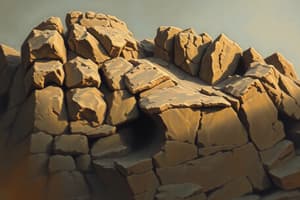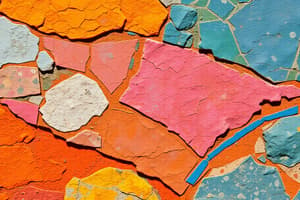Podcast
Questions and Answers
How are sedimentary rocks classified?
How are sedimentary rocks classified?
- Into two groups based on how they form (correct)
- By their color
- By their texture
- By their age
What is the definition of a clastic sedimentary rock?
What is the definition of a clastic sedimentary rock?
Clastic rocks are composed of fragments, or clasts, of pre-existing minerals and rock.
Examples of three different clastic sedimentary rocks are ___, ___, and ___.
Examples of three different clastic sedimentary rocks are ___, ___, and ___.
Conglomerate, Breccia, Sandstone
What is the definition of a chemical sedimentary rock?
What is the definition of a chemical sedimentary rock?
Examples of three different chemical sedimentary rocks are ___, ___, and ___.
Examples of three different chemical sedimentary rocks are ___, ___, and ___.
Name and describe a way that sedimentary rocks are commercially valuable to society.
Name and describe a way that sedimentary rocks are commercially valuable to society.
Sketch and describe sedimentary structures such as cross beds and fossils.
Sketch and describe sedimentary structures such as cross beds and fossils.
Describe the 6 main sedimentary depositional environments.
Describe the 6 main sedimentary depositional environments.
Name and describe a sedimentary rock that would form in each environment.
Name and describe a sedimentary rock that would form in each environment.
What happens during a transgression?
What happens during a transgression?
What happens during a regression?
What happens during a regression?
Flashcards are hidden until you start studying
Study Notes
Classification of Sedimentary Rocks
- Sedimentary rocks are classified into two main groups: clastic and chemical, based on their formation process.
Clastic Sedimentary Rocks
- Composed of fragments called clasts from pre-existing minerals and rocks.
- Clasts arise from physical weathering and include various minerals, with clays and quartz being the most common.
- Formed through the cementation of weathered rock bits.
Examples of Clastic Sedimentary Rocks
- Conglomerate: Contains rounded pebbles, cobbles, or boulders with finer sediments interspersed.
- Breccia: Features angular clasts and is poorly sorted.
- Sandstone: Made up of sand-sized grains, usually with distinct layers.
- Shale: Composed primarily of fine-grained clay minerals, known for its sheet-like breaking.
Chemical Sedimentary Rocks
- Form when minerals precipitate from solutions or settle from suspensions.
- Occur when dissolved minerals in water deposit as solids.
Examples of Chemical Sedimentary Rocks
- Rock Salt: Mainly made of halite, formed from evaporated seawater.
- Limestone: Can form through inorganic precipitation in water or via chemical reactions.
- Coal: Derived from compacted plant remains, varying in hardness and shine depending on heat and pressure.
Commercial Value of Sedimentary Rocks
- Cement: Produced from limestone; essential in constructing concrete for infrastructure.
- Coal: Formed from plant remains in wetland environments; primarily used for electricity generation.
- Uranium: Found in sandstone; utilized for electricity generation through nuclear energy.
Sedimentary Structures
- Common features include cross beds, graded beds, mudcracks, ripplemarks, and fossils.
- Each structure aids in interpreting the environmental conditions of formation.
Sedimentary Depositional Environments
- Environments include terrestrial (e.g., rivers), near-shore (e.g., deltas), and oceanic (e.g., deep sea).
- Each environment influences the type of sedimentary rock formed.
Transgression and Regression
- Transgression: The landward migration of the shoreline, leading to changes in the sediment type and aquatic features like lagoons and reefs.
- Regression: The seaward migration of the shoreline, resulting in the exposure of previously submerged areas and sediment type changes.
- Both processes alter rock sequences observed in stratigraphic sections.
Studying That Suits You
Use AI to generate personalized quizzes and flashcards to suit your learning preferences.




